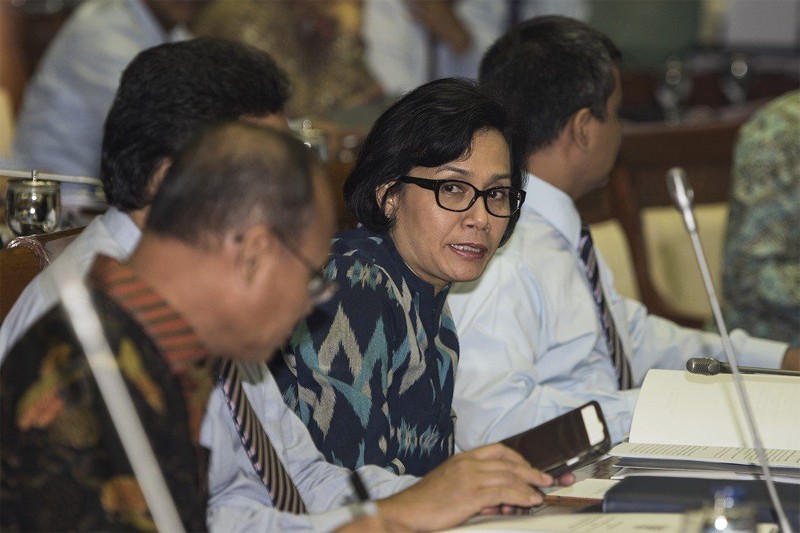Popular Reads
Top Results
Can't find what you're looking for?
View all search resultsPopular Reads
Top Results
Can't find what you're looking for?
View all search resultsCash-strapped budget hits Indonesia
Change text size
Gift Premium Articles
to Anyone
T
he country’s cash-strapped state budget has taken its toll on fund transfers to regional administrations and will lead to lower economic growth this year, state officials say.
Bank Indonesia (BI) estimated that state revenue shortfalls could be greater than the government’s forecast and more budget cuts may need to be made, governor Agus Martowardojo said.
“This is an uncomfortable discussion but it needs to be done. Indonesia, which has solid fundamentals, can be considered weak if our fiscal condition is not sufficiently strong. Foreign funds will easily exit and create a setback to our economy,” he told a meeting with the House of Representatives on Tuesday evening.
President Joko “Jokowi” Widodo has issued a presidential instruction (Inpres) to cut state spending by Rp 137 trillion (US$10.3 billion) due to a Rp 219 trillion revenue shortfall as the government has admitted that it previously set the tax target too high.
BI estimated that the budget cut would slash economic growth by 0.1 percent this year to between 4.9 to 5.3 percent, in contrast to the government’s target of 5.2 percent growth.
Finance Minister Sri Mulyani Indrawati agreed with the central bank’s estimate, separately telling lawmakers on Wednesday, “this is an implication, however, to manage the state budget, I myself as a finance minister must run it by the state budget law”.
Sri Mulyani, who replaced former finance minister Bambang Brodjonegoro in Jokowi’s second reshuffle in late July, convinced the President to again revise the state budget after spending grew faster than revenue, potentially leading to fund shortages for the government’s development programs.
Apart from cutting ministries’ and state institutions’ spending, another option to keep the budget in check is to delay fund transfers to regional administrations. Sri Mulyani estimated the deficit ending the year at 2.5 percent, versus previous estimates of 2.35 percent and nearing the legal threshold of 3 percent of the nation’s gross domestic product (GDP)
Overall regional transfer and village funds worth Rp 72.9 trillion would be delayed until next year, from the initial plan of Rp 776.3 trillion, which would hit the general allocation fund (DAU) and revenue-sharing fund (DBH) hardest.
The DAU, which is primarily used for capital expenditure, would be cut by Rp 19.4 trillion while Rp 16.7 percent would be shaved off the DBH, which is allocated based on a region’s potential. The remaining Rp 36.8 trillion cut would be sourced by slashing village funds, special allocation funds and tax revenue-sharing funds.
The regional transfer cut would surely affect local administrations because the funds are a vital revenue source for them outside locally generated income, said Kenta Institute senior economist Eric Sugandi.
“However, instead of increasing their budget deficits, they will opt to cut their spending,” he said, adding that infrastructure expenditure would be most vulnerable to the cut, as regions won’t slash their civil servant salaries.
The austerity measure on regional administrations can force them to spend more efficiently considering a big chunk of idle fund transfers from the government, worth a total of Rp 224 trillion as of July, remain untouched at their local banks, economists and the finance ministry say.
“This [the funding cut] can encourage local governments to spend their idle funds,” Finance Ministry director general for budgeting Askolani said.
The government had yet to learn if the cut would increase local budget deficits, he added. A Finance Ministry regulation only allows the local budget deficit at most 0.3 percent for this year’s state budget.
The local administrations’ budgets have historically recorded balance or surplus as they are not allowed to borrow or raise funds from the financial market.
The central government needs to cover any potential regional budget deficit because it was the party that can seek loans or generate funds from the capital market through bond issuances, said Samuel Assets Management economist Lana Soelistianingsih.
________________________
To receive comprehensive and earlier access to The Jakarta Post print edition, please subscribe to our epaper through iOS' iTunes, Android's Google Play, Blackberry World or Microsoft's Windows Store. Subscription includes free daily editions of The Nation, The Star Malaysia, the Philippine Daily Inquirer and Asia News.
For print subscription, please contact our call center at (+6221) 5360014 or subscription@thejakartapost.com.










